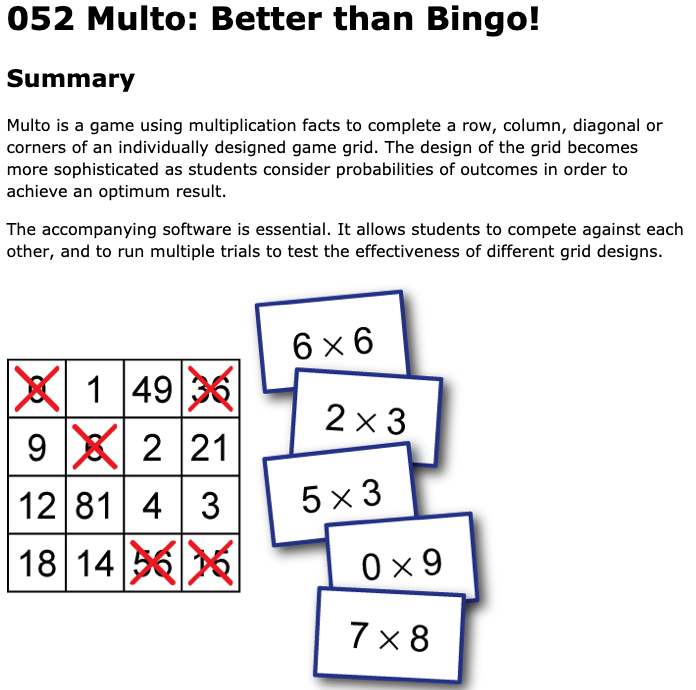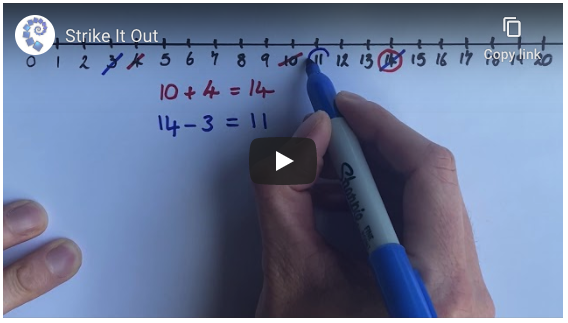Last week during one of my webinars a teacher asked “what maths games do you recommend”? What a great question! My first response was anything with cards, dice or dominoes and I went straight to recommending Paul Swan‘s work. His books have always been a staple in my mathematics classroom and his website is fantastic and includes many free games as well. Paul is continually creating new games and resources to support teachers of mathematics.
I also use a number of games that were developed as part of the Maths300 resource by AAMT. It is rare that I recommend schools purchase subscriptions – but this is definitely one you should pay for. There are a few free tasks to trial on the Maths300 website if you are interested or you can access trainers such as @Fiona_Foley from MANSW who can lead professional learning on using the Maths300 tasks. Their classic game of Multo (a version of bingo) builds knowledge of multiples and the relationship between multiples (commutative property e.g. 2x 3 = 3 x 2).
From my time working for the NSW Department of Education, I also use a number of mathematics games using cards or dice the department developed as well as games created as part of the Count Me In Too Project that can be accessed via the Developing Efficient Numeracy Strategies DENS resource. Roll 5 dice is a simple game that assist students in developing a range of additive strategies, not just ‘start with the big number’ e.g. doubles, triples, near doubles, combinations to ten. The game can be extended so that students can take any of their numbers as a ‘tens’ to try and make their total closest to 100 in one turn.
I think I was also lucky enough to have a family who enjoyed (and had the time) to play games. At the time I didn’t really consider the mathematics behind most of them but they were powerful for building mental computation strategies, critical thinking and strategy. Even games such as Snap, Memory, Scrabble, Bingo, Connect 4, Checkers, Backgammon, Mahjong, and of course Yahtzee, have elements that require mathematical thinking.
One example card game from my childhood that I still love playing is Crib or Cribbage. Hearing someone at the end of their round scoring might sound like this “15-two, 15-four, 15-six, a pair’s eight and three is 11.” The game involves taking turns to play cards trying to get to 31 during the game, and making 15s, pairs, and runs after the game. The winner is first to 121 points. Scoring can also occur during the game, but without a full explanation you get the gist – there was lots of maths! You can read more about how to play here and the maths behind Crib here.
Maths games-so much more than a 'warm-up'! #iteachmath #MTBoS @tobyrusso @kath_cartwright @helenjwc @Simon_Gregg @attard_c @ayliedavidson @MTLC_ACU @AusTeacherRiss @DavidKButlerUoA @MathsXer @Corovie @mic_epstein @mminas8 @robproff1 @NadiaWalker_eduhttps://t.co/Yl61e1QV28
— James Russo (@surfmaths) June 9, 2020
Games are a vital part of mathematics classrooms and mathematical learning. James Russo (@surfmath) and Toby Russo (@tobyrusso) recently published an article Transforming mathematical games into investigations. The article shares games the authors have used to design deeper mathematical investigations around by investigating for example, the game’s structure, rules, or mechanics. They also suggest 5 principles of educationally-rich mathematical games:
- Students are engaged
- Skill and luck are balanced
- Mathematics is central
- Flexibility for learning and teaching
- Home-school connections
These principles provide guidance for how to select appropriate mathematical games for your students, or your children at home. In the words of Atari’s founder Nolan Bushnell:
“A good game is easy to learn but hard to master.”
Nrich also provide some wonderful games that are easy to play and develop mathematical thinking skills for example, Strike it out. The game has both a competitive and cooperative aim and focuses on addition and subtraction of numbers under 10 or 20. Nim is another classic game of strategy that requires mathematical and logical thinking, nrich’s Nim-7 version of the game uses 7 counters, each player takes turns taking away 2 counters, with the person who takes the last counter being the winner. The games on Nrich also provide solutions, helpful hints, teaching guides, and related games.
Tonight the fabulous Doug Clarke presented his first webinar "Building number sense in the primary years" to a captivated audience. Doug explored games, activities and key concepts to develop number sense in students. Register now for Series 2 https://t.co/e2FwIBITmm #mathspd pic.twitter.com/AU8YXBss7E
— Mathematics Teaching and Learning Centre (@MTLC_ACU) August 4, 2020
Another person who comes to mind when I think about maths games is Doug Clarke. Every time I see him present, he shares another great game or task. His games are easy to use, don’t generally require too many resources, and can be repeated. Repeatability in a game is essential for building mathematical conceptual knowledge and understanding over time. His article written with Anne Roche in 2010 on The power of a single game to address a range of important ideas in fraction learning supports repeated game play stating that:
“In fact, we believe strongly that teachers should encourage students to play the game in full at least three times, in order for its potential to be realised” (p. 20)
There are also plenty of new games being developed by educators such as @mminas8 who is currently creating a new game a day and @ATMMathematics with their Math Snacks.
Brand new game that was just created last week, inspired by the work of @surfmaths. Challenging and fun way to develop multiplicative thinking. Enjoy!https://t.co/8dtCNZSddD via @YouTube
— Michael Minas (@mminas8) August 5, 2020
New Maths Snacks videos have been added today. These are Domino Rings and Same Spots. Approx 2 mins long, they are brilliant for both classroom and home learning. #mathssnacks #teaching #learning #primary #secondary pic.twitter.com/YFx5FHRGpT
— Teachers of Maths (@ATMMathematics) June 30, 2020
So what’s your favourite maths game? If you could just recommend one, what would it be? Either add your maths game suggestion in reply to this blog via Twitter, Facebook, or email. I’d love to compile a ‘best of’ list from your collective knowledge bank. I’ll then write my next blog highlighting some of the suggested games. So now, it’s over to you!








